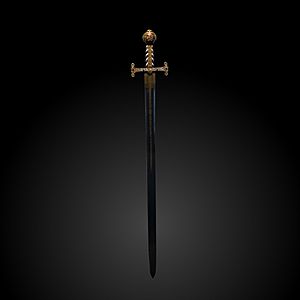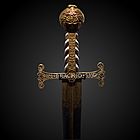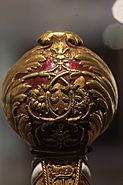Sword of François I facts for kids
Quick facts for kids Sword of François I |
|
|---|---|

General view of the sword
|
|
| Service history | |
| In service | from 1510–1515 to 1525 |
| Used by | Francis I of France |
| Wars | Italian War of 1521–26 |
| Production history | |
| Designed | 1480 (blade) 1510–1515 (handle) |
| Manufacturer | P.A. Cataldo (blade) |
| Produced | 1510–1515 |
| No. built | 1 |
| Specifications | |
| Blade type | Knightly sword |
| Hilt type | cruciform hilt |
The Sword of François I is a special ceremonial sword made around 1510–1515. It has an older blade from about 1480 and a custom-made handle. This sword was taken by Spanish forces during the Battle of Pavia. Later, in 1808, it was brought back to France by Murat. Today, you can see it on display at the Musée de l'Armée (Army Museum) in Paris, France.
History
After the Battle of Pavia on February 25, 1525, a soldier named Juan Aldana took the sword. It was a "spoil of war," meaning something valuable taken from the enemy after a battle.
In 1585, Juan Aldana's son sold the sword to King Philippe II of Spain. Many years later, in 1808, France occupied Spain. The French leader Napoléon ordered his general, Murat, to bring the sword back to France. Murat then put the sword on display in his study at the Tuileries Palace in Paris.
Description
The sword is very fancy and decorated. It features a salamander, which was a personal symbol of King François I. Because the sword does not have a royal crown on it, experts believe it was made before François I became King of France.
The sword's guard (the part that protects the hand) has a special message. It shows a verse from a famous Christian song called the Magnificat. The words are « Fecit potentiam in brachio suo ». This Latin phrase means "He put strength in his arm."
- Details of the handle
See also
 In Spanish: Espada de Francisco I para niños
In Spanish: Espada de Francisco I para niños
 | James Van Der Zee |
 | Alma Thomas |
 | Ellis Wilson |
 | Margaret Taylor-Burroughs |




